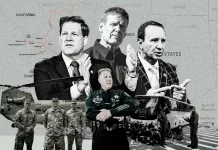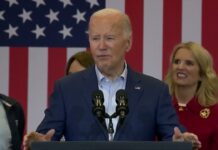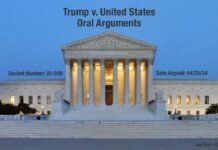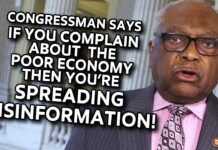In my new book, Devolution of Power: Rolling Back the Federal State to Preserve the Republic, I address a question more and more citizens are asking: Can a distrusted federal government unite and govern this polarized country? If not, how do we divide?
Readers should not quickly dismiss the idea of devolving federal domestic powers to the states. First, the federal government is de facto bankrupt. Within a decade, it will be forced to substantially reduce or eliminate the subsidies it gives states to implement over a thousand programs the federal government lacks the constitutional authority or resources to implement. The loss of state subsidies will be the catalyst that ignites the devolution of federal powers to the states.
Second, the federal government and the states had a workable power-sharing relationship until the Great Depression. Moreover, until the early 1900s, the collective budgets of the states were larger than the federal government, and states managed most of the nation’s domestic policies. Since 1980, however, there has been a massive explosion of federal power, evidenced by the fact that 97% of the national debt has been accumulated under the last seven presidents. For the federal government to again be a viable governing entity, it must shrink itself so it can competently manage the essential needs of the nation.
If it is constitutional for the federal government to accumulate power by taking it from the states, it is constitutional for the federal government to return many of these domestic powers to the states.
Devolving power to the states is possible since the U.S. federal government is not the United States, although it acts as its ruler. Instead, it is an instrumentality of the people established to manage their governmental affairs. None of our federal officials are granted power as individuals. They are merely volunteers elected as representatives to temporarily manage our government.
Unfortunately, since the federal government’s creation, the individuals acquiring federal power have skillfully blended the powers of the three federal branches into two competing power structures not established by the Constitution. These power structures are called political parties. As such, citizens are no longer protected by the Constitution; they are protected by Democrats or Republicans, depending on which party controls the government apparatus.
Polls show only 20% of citizens trust the U.S. federal government to do what is right most of the time. Almost half of Americans believe the nation is as close to the edge of a Civil War as it was in 1861. Political commentators, mainly on the political Left, pontificate the U.S. will divide into red and blue states or red states will secede from the Union or reform state boundaries. These commentators would welcome unrest in the red states. They fully grasp that the federal government will use all the emergency powers Congress delegated to it and any force necessary to maintain its stranglehold on every aspect of national life. Americans were given a glimpse of these powers in Covid.
Devolving many domestic federal powers to the states may be the only alternative governing mechanism to keep the Union together. It would allow citizens of the respective states greater freedom to live under policies reflecting values closer to where they live rather than national values imposed on them by a distant government and powerful national advocacy groups that do not understand or care about the needs of citizens. In this new governing structure, the federal government would focus on its essential responsibilities to protect the nation, manage activities that directly (not incidentally) impact interstate commerce, defend the dollar’s value, and reduce the national debt. The states would manage most of the nation’s domestic policies, e.g., crime and punishment, labor and environmental standards, energy production, abortion, economic development, permitting, and immigration other than naturalization.
How the U.S. is governed should concern every American since we live with the consequences of the federal government’s massive debt, regulatory sclerosis, continuous wars, open borders, and a declining ability to protect the nation. In our complex society, the cooperation of all levels of government is needed to make society function efficiently for its people. It’s time the federal government stopped worrying about accumulating power and control over citizens and focused on what benefits citizens.
While commentators in the UK, Scotland, and New Zealand have written about devolving federal power to better manage government, the topic is just now being addressed in the United States.
Unlike many books on government reform, Devolution of Power is not just a list of complaints that leave readers seeking solutions. It provides a roadmap for promoting freedom by unwinding the massive accumulation of federal power by returning many domestic functions to the states. It addresses how to restructure a federal government before it collapses the nation by:
- Identifying the federal government’s apocalyptic flaws,
- Setting out mechanisms for trimming the national debt and the federal bureaucracy,
- Providing options for rolling back federal power,
- Outlining a restructuring plan to devolve federal power to the states and
- Describing the character traits needed by elected officials to restore trust in government.
The book laments how Congress has fallen into irrelevancy by delegating its most important powers to the president, including declaring war and national emergencies, unauthorized spending, and ignoring the unconstitutional consequences of presidents making new laws by regulation and Executive Order. The book argues that only when Congress regains control over its legislative and spending powers will it understand it created a federal government too big and complex to govern the nation. At that point, the restructuring process can begin.
A fundamental premise in the book is that until our elected officials rekindle John Locke’s idea that no power is granted personally to any government official, every official must serve as fiduciary, not a self-interested politician. To serve as a fiduciary, elected officials must give all their loyalty to the institution they serve and not to the political party that helped elect them. Only by being loyal to the institution they serve can they check the abuses taken by the other branches of government. Only by actively defending our Constitution’s separation of powers structure, no matter who is in charge of the other branches, can our elected officials restrain government and promote the rule of law.
In the final analysis, Devolution of Power argues that the citizens of the U.S. must understand they are responsible for their government and what it does. Citizens do not have the “just following orders” defense since they elect the individuals who manage their government. The citizens of the U.S. are now confronted with an “either/or” situation. Either citizens elect a government of fiduciaries that limit the power of the federal government, regardless of political affiliation, or they must accept living under an all-powerful federal government that is organized around corruption, deception, and eventually brutal tyranny.
William L. Kovacs, author of Devolution of Power, has served as senior vice president for the U.S. Chamber of Commerce, chief counsel to a congressional committee, chairman of a state environmental board, and a partner in law D.C. law firms. He testified before Congress forty times in his career and participated in hundreds of federal rulemakings. His book Reform the Kakistocracy won the 2021 Independent Press Award for Political/Social Change. 2019, Kovacs received the Albert Nelson Marquis Lifetime Achievement Award from Marquis Who’s Who.
Tags: Federalism, states, federal government, public officials, Fiduciaries, Separation of Powers, National Debt, devolve power to states,
Key Word: Devolution of Power
Meta description: The federal government has accumulated more power than it can manage. It must devolve many domestic powers to the states so it can focus on defending the U.S..













































